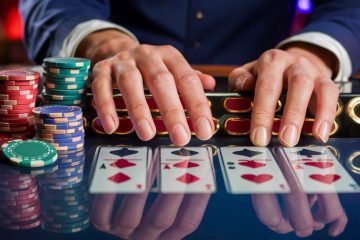The Most Addictive Casino Games and Their Psychological Impact
Understanding the Behavioral Patterns of Casino Gaming Addiction
Slot machines remain supreme as the most addictive casino game because the newly developed game software employs psychological triggers of intermittent reinforcement. These machines can deliver up to 600 game experiences per hour, creating a massive dopamine surge in players’ brains. And The fast tempo of modern slots, intensified by stimulating audio-visual effects, makes for sinking into this type of gambling circuit at an even higher pitch.
Games which Are Both Strategic And Tricky
Video Poker and Blackjack
Video Poker and Blackjack draw on the superstition of control. They are arid games but discipline and perseverance reap their own rewards in issues of appropriate psychology for surviving the Clash with Fortune:
These games manipulate addiction through:
- Difficult decision paths
- Experiences which are almost a miss
- Strategic elements of gameplay
- The chance to make a big show or gain final celebrity in fine detail
High-Octane Table Play
The spinning wheel of a roulette table creates intense psychological involvement. Each time the wheel turns, waiting for a red to come up occupies your emotions and you actually physically start tensing up again. while its varied betting opportunities sustain constant player interest
Craps is the pinnacle of social casino addiction because few activities encourage:
- Excitement shared by everyone
- Intelligent betting systems devised as a group
- Group dynamics
- A strategic depth
- Moments of tribal rejoicing
Behavioral Psychology in Casino Design
The Modern Casino Games Get Players Hooked Using Advanced Behavioral Psychology
An understanding of these refined technical tricks helps point out the transition from casual diversion to compulsive behavior. Game designers use what they know about how the mind works to avoid boring you:
- Variable schedules of outcome
- Visual and audio feedback
- Sharp Risk Edges
- Goals seldom achieved
- Progressive Ferrofluid Networks
Slot Machines: A Masterpiece of Psychological Engineering
Dopamine-Driven Design of the Slot Floors in Las Vegas
Modern slot machines are a masterpiece of behavioral science and psychological engineering, built to tap into the brain’s most basic reward mechanisms.
These sophisticated gaming devices function on intermittent reinforcement, an important psychological principle that involves giving rewards just at the right time but never too often.
Algorithms and Player Psychology in Advanced Gaming Machines
The core technology behind the design of slot machines plays on player psychological weakness. Complex algorithms located inside a slot machine fool players: They win after a fixed number of Lose-Win-Progress sequences, just as if by happenstance they had picked exactly where and when to stop.
By blending together various visual and audio sensations, these machines provide an all-embracing environment where even losses feel like winning opportunities.
This psychological manipulation allows the player to maintain a consistent level of dopamine activation no matter what the actual outcome.
The Precision of Mathematics in Game Design
Modern slot operations are built on a base of return-to-player percentages, ensuring predictable house edges while still keeping players interested.
By strategically mixing up the various pathways of reward—including lockstep progressive jackpots and bonus rounds—one can create multi-layered compensation systems able to hide skillless patterns of loss and promote public image.
Psychological Impact of High-Speed Game Rat
The psychological effects are most apparent in the 토토사이트 순위 high-speed game interaction. There exists a creation of strong conditioning loops.
With rapid play combined with set rewards structures, modern slot machines are very likely to result in a consistent pattern of gaming activity over time.
Video Poker from a Strategic Source

Understanding the Strategic Elements of Video Poker
Mathematics and Strategy Advantage
Video poker is a game of skill, which distinguishes it from the purely luck-based casino games. Its unique appeal lies in the mathematical side to winning out over house odds, and therein strategy makes good sense: If players play perfectly, they can reduce their disadvantage to just under 1%.
This is a fore of lucid, sophisticated, and mathematically-structured skill gaming.
Complexity of Strategy and Decision-Making
The central appeal of video poker strategy comes from its intricate systems of decision-making. Players must take into account simultaneously many different factors, from the payouts on each table and considerations involved in card combinations, all while making quick judgments that shape their fate.
This level of strategic depth lifts video poker out of the realm of mere gambling on one hand into one where faculties are engaged, though reversing the equation to Strategic casino planning perfect expected value demands much dedicated study and practice.
The Psychology of Video Poker
The psychology of video poker works on a detailed behavioral rationality mechanism. The game’s quick pace and continuous demand for decisions makes for a deeply immersive experience, condensing us right into the field of actual gameplay.
When the right strategic choice ends up in a win, this sense of psychological validation positively encourages players to continue in the game. Nonetheless, this same mechanism can contribute to long sessions on the part of the player and its defeatist strategy to always be making wrong choices even if we know that some responses are better than others.
Critical Factors
Despite the strategic component, video poker ultimately presents a disadvantage for the house. The game’s ambivalence serves both as an attraction and also as a risk, for it assumes players are more capable of surmounting the mathematical edge by skill alone than is actually realistic.
Understanding this basic insight is essential to sensible behavior and strategic decision-making in video poker.
Roulette’s Enchanting Wheel
The Psychology Behind Roulette’s Enchanting Wheel
Casino’s Signature Game Endures Throughout Time
Over generations of casino evolution, the roulette wheel has established itself as the very symbol of luck and chance. The hypnotic whirl of it going round and round combined with systematic ball-tracing create an intense psychological attraction that can cause people to play for hours on end.
There is a timeout between spins. It fits well with the general law of learning and experiences, the result however, is the reverse of what is normally expected.
Understanding the Psychological Process Behind Roulette
The game’s unique appeal lies in its perfect fusion of simplicity and complexity. While simple bets on a colored space will suffice as entry points into the field, the various intricate bet combinations convey an impression of sophistication and control.
Clinical tests confirm how these perceived mechanisms of control, combined with “near miss” experiences, can help to consolidate the tendency for addiction.
The Sensitivity of Roulette’s Mechanical Nature
The turning motion of the wheel and the particular sound it makes when a ball is brought into play produce a state which has been shown to be hypnotic for players. This kind of rhythmic movement affects decision-making powers and perceptions of the passage of time.
In studies, it has been established that the players are out of touch with their temporal situation and the size of their losses, roulette remains one of those casino games offering a strong element psychologically.
Blackjack’s Illusion of Control
The Psychology of Blackjack’s Illusion of Control
Understanding the Error of Overconfidence
Blackjack’s unique mix of skill and luck creates a potent deception for players by providing them with control.
Under a realistic possibility of it all, the fate that comes from dice can feed on demand during blackjack.
Hence, our very language now embodies specific semantics for describing different degrees of near-win in blackjack.
Psychological Fact and Perceived Control
Psychology broadens when players memorize basic strategy. Their odds will slightly increase while facing The House on Fact and Me: About 0.5%. As this improves chances, however, experience plays contrary to them.
Craps and Social Reinforcement
Social Forces Explained
Craps, from point of view studies in sociology to split decision timing structure, creates a strong reinforcing psychological environment:
- Social approval through group celebrations
- Dopamine activation from communal wins
- Tribal bonding mechanisms
- Variable reward schedules
- Ritual behavior patterns
- Peer pressure effects
This communal atmosphere not only buoys up any group to greater heights but also gives them rewards as their membership in society increases.


